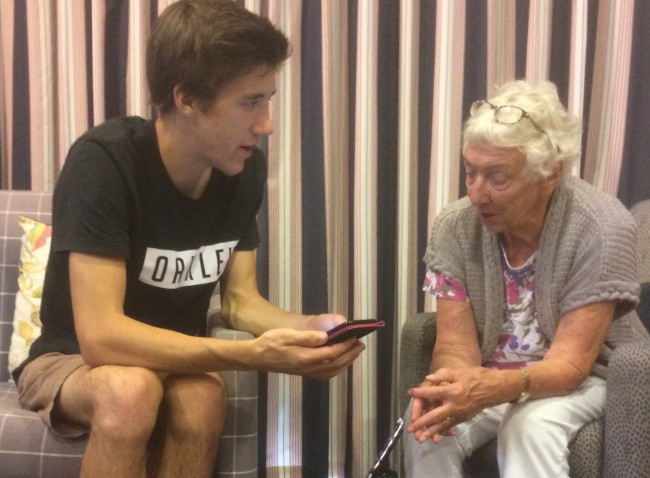
The problem with educating boys
Queenstown teacher and writer Poppie Johnson takes a detailed look at why kiwi boys seem to do better in single sex schools - but Wakatipu High School does better than most NZ co-ed schools.
Education is an area that is is easy to have an opinion on. After all, we’ve all attended school and that personal experience can form the basis for judgements that last a lifetime. What is harder is finding quantifiable data to support those views.
By nature, education studies must be longitudinal. That is, to be taken credibly they must show the same data trends over a number of years.
The gender gap of achievement is a key issue in education in New Zealand. Alongside priority learners (Maori and Pasifika students), the consistently lower rates of boys’ achievement remain a worrying trend and one the is tracked by both the Ministry of Education and the New Zealand Council for Educational Research (NZCER).
Earlier in the week, Dr Michael Johnson of Victoria University released the results of his independent comparative study on the results boys achieve in same-sex vs co-educational schools. It makes for interesting reading. Data gathered from 2013-2015 shows startling results. Taking information from 49 all-boys’ schools and 448 co-ed schools, Dr Johnson looked at median achievement rates in NCEA Level 2 and University Entrance, as well as those leaving with no qualifications. Across all deciles and ethnicities the boys’ schools scored higher. Significantly higher. Over the three years’ data nearly 20% more students achieved University Entrance at the boys’ schools. Nearly 12% or more achieved Level 2.
This data is unequivocal: boys are achieving better in a single sex environment. But what is the gender gap and why is it becoming as stark as it is in our co-ed high schools?

Why do boys do better in single sex schools?
Achievement is a key aspect of education but there are other factors, social maturity, opportunities, while all boys’ education may work for one it is not a universal panacea. It is also not an option for those who live outside of larger cities with a population base to support multiple high schools of different ethos and identity - including single sex high schools. If there’s a boy’s only school in town then there has to be a girls’ only school. Add in a co-ed and single sex education is only an option for towns with a population that requires a minimum of three high schools.
Yet boys are not born stupid. A Y chromosome is not a genetic reason for literacy difficulties. Gender is not hardwired to determine academic achievement.
The gender gap of achievement is not just in New Zealand. Across the world there is an increasing and concerning trend when it comes to boys’ achievement. An OECD report of over 60 countries shows that girls are consistently out-performing boys in 70% of the case studies. There are of course outliers - boys still occupy the very top places of achievement. They also occupy the very bottom. It is the middle of the bell curve where they are falling far behind.
We do a pretty good job here in Queenstown. Our boys achieve above the national average for decile 10 co-ed schools in NCEA and University Entrance. No small feat. That decile rating spans a far greater area and more diverse backgrounds than other comparable ones with a smaller geographic footprint. Our students win scholarships and are among those aforementioned top performers. Problem is, on average, the girls are still doing significantly better than the boys in all major measures. Numbers are pretty even so its not a case of small data groups skewing the distribution.

Wakatipu High School - "We do a pretty good job here in Queenstown."
The government and Ministry of Education are aware of the gender gap, it’s not new news. A detailed report concluded as long ago as 2007 concluded that:
The results from national and international assessment surveys show that gender gaps in favour of girls are present in reading in New Zealand … There is also evidence that boys do less well in writing. These skills are fundamental to full participation in a knowledge based society and thus the relative under-performance of boys is of concern. In other areas, such as mathematics and science, the results for boys and girls are similar and, in some cases, boys out-perform girls overall
Th report itself is long, detailed and based on a lot of statistics. There’s a snapshot leaflet that covers a few main points if you’re interested in further reading. Essentially, in its most simplistic form, many of the issues with boys’ achievement can be traced back to early problems with reading and subsequent disengagement.
Literacy is a cornerstone of educational achievement. It is what governmental policy is founded on and most schools have at least one of their key goals centred around literacy progression and achievement.
Girls read more than boys. Girls do better in assessments than boys.
So what works?

There are no definitive answers to the question of the education gender gap - bu there are trends.
If there have been innumerable studies and pilot programmes to identify the problem then how do we answer that very question? If there were a definitive answer then it would be a simple matter of implementation. That’s not the case. However, there are trends.
As Dr Johnson’s study has proven, boys work well when placed with other boys in a competitive environment. Single-sex schools have higher rates of achievement and where boys’ only classes have been created in co-ed schools there has been a concomitant rise in achievement. Kings High School in Dunedin recently implemented an acceleration programme and Scholarship specific classes. In a few short years they have rocketed up the rankings and last year achieved the highest number of scholarships in Otago. Macleans College in Auckland and Wellington College have similar programmes - with similar results.
Great. Just get the schools to implement traditional all boys classes with rankings and competitions and we’ll be sorted then? Well, not quite. These are trends, things that have been shown to work in certain situations and always where there are other options available. After all, no-one is one size fits all.
Digging a little deeper, there is more to it than putting boys into a traditional environment with acceleration, rankings and competition. A ‘whole learner’ approach has seen significant success. Taking into account the underlying issues, integrating the mental, physical and developmental stages of the developing boy has seen the most dramatic changes.
This holistic approach makes use of male role models, creates a desire to learn among students and recognises the physical needs of boys to be active and to expend energy before being able to focus.

New Zealand has the second highest rate of bullying in the OECD. Students need to feel safe.
The holistic approach recognises the need for students to be safe. New Zealand has the second highest rate of bullying in the OECD with 26% of students having experienced bullying repeatedly on a monthly basis over the previous year. If students don’t feel safe at school then it is difficult, if not nigh on impossible, for them to express themselves and to be vulnerable. That vulnerability allows students to open themselves up to failure - a place where some of the most valuable learning takes place.
There are some great initiatives being put in place in pockets across the country that recognise this. Chris May, a Hamilton teacher, runs a programme for Year 8 boys that focusses on applying learning to practical life skills. His Nga Tama Toa programme, (which translates as Empowering Boys to be Great Men) has had tremendous success. Through contextualising the learning with tasks like changing a tyre, cooking a meal, even volunteering in the community, he is able to engage with the boys on a more meaningful level that helps them to reconnect with the school environment.
Rotokawa School near Rotorua implemented an all boys Year 6 class at the start of this year. They do fitness every morning to burn off energy and read books and study topics that are chosen by the boys and of more interest to them. Their achievement has increased and the boys are calmer and more settled than they were in previous classes.
There are other similar programmes throughout the country. It is interesting to note that those with the greatest success are run by male teachers. That’s no indictment on the skills or dedication of female teachers, merely a commentary on the importance of strong male role models.

Boys do better when taught by a male teacher. Male teachers are perceived as stronger role models for boys than female teachers.
Many of these programmes occur in the primary school years. The brain develops in an inverse exponential level. The first three years of a child’s life sees them develop 85% of their brain connections. The importance of these early years has been stressed often. That doesn’t mean that if they’re in the past its all over. The brain continues to develop at a startling rate until around age 16. Most importantly, it is adaptive. Changes in routine, diet, exposure to new locations, all of these things have an influence on brain development. Essentially, the rate of change may slow, but there is still far greater neuro plasticity, potential for change, among the young.
A recent UK study by the London School of Economics proved that boys will not try as hard if their work is being marked by a woman - because they believe their results will be worse. Only 25% of our teaching staff in New Zealand are male - and many of these are in management positions that take them out of the classroom. At a governmental level we can push hard to recruit more male teachers - and recognise their unique value in raising boys’ achievement. There is also work to be done on breaking down the perceived bias that boys see in female teachers. If male teachers aren’t available we can make use of the community to make learning have a real world context, as well as bringing in external role models. It may not be politically correct to target male teachers but the benefits have been proven.
Continuing education for teachers in the most effective pedagogies for boys will help ensure that our education system is responsive and innovative. Further research will help shed light on new methodologies - as will a continued global discourse to see where there are successes and where there are regressions in the statistics and achievement rates.
The most successful boys, the ones who occupy those spaces at the very top and defy the trends, are those who have had reading as an integral part of their lives from the early days. Schools do not carry that weight alone. Wider society can help dramatically. The culture of what is normal can help to define how growing minds approach reading and learning. A responsible society celebrates literature and the written word, creates opportunities for success to be lauded and provides public resources such as libraries to ensure that opportunity is not socio-economically limited.
There are things we can do at home. Men, put down your lawnmowers and hammers and pick up a book. Let your sons, nephews and employees see you reading for the pure pleasure of it. Pick up a novel rather than your phone. Talk about the things you read and let your enthusiasm be infectious. Create a culture of words in your family and make the library a place of regular visits and of excitement.
It is too easy to offload responsibility for the big issues - especially the ones that seem to require specialist knowledge to solve. As with any problem that is important there is no single solution, nor any guarantee of success. We owe it to our boys to continue to try, to recognise that they learn differently and that our actions now can make a difference to their future.
Poppie Johnson is a writer and experienced high school English teacher, based in Queenstown. She grew up between Aoraki-Mount Cook and Christchurch, and has worked as a chef, ski patroller and youth work manager, prior to her career in education. Poppie is currently completing the final year of her Masters in Creative Writing through the University of Edinburgh.
Read: Poppie Johnson imagines a letter from her baby son - thirty years in Queenstown's future.





























